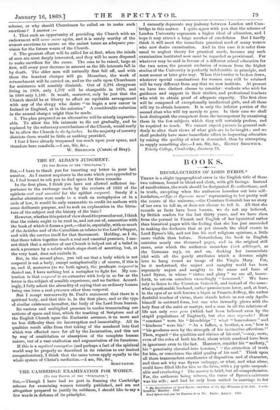THE ST. ALBAN'S JUDGMENT.
[TO THE EDITOR OF THE "EPECTITOR,1
have to thank you for inserting my letter in your last number. As I cannot acquiesce in the note which you appended to it, I feel bound to ask you to find space for these remarks.
In the first place, I think you have not allowed sufficient importance to the exchange made by the revisers of 1662 of the epithets real and essential for the epithet corporal. Surely if a similar alteration were made in a work on metaphysics or in a code of law, it would be only reasonable to credit its authors with some deliberate purpose, and to seek an explanation in the literature of the subject and the history of the time ?
However, whetherthispointof view should be pressed or not, I think that the rubric ought to be read in, and not out of, connection with the book of which it forms a part,—that is, especially, with so much of the Articles and of the Catechism as relates to the Lord's Supper, and with the service itself for that Sacrament. Holding, as I do, that these taken together teach a real and essential presence, I cannot think that a minister of our Church is helped out of a belief in such a presence by a rubric which stops short of asserting, but, at the very least, does not exclude it.
But, in the second place, you tell me that a body which is not corporal is not a body, except metaphorically ; of course, if this is so, and if, moreover (as we both agree), the predicate corporal is denied me, I have nothing but a metaphor to fight for. My contention is that corporal is co-extensive with body in so far as the latter is the subject of sensible experience, and no further. Accordingly, I fully admit the absurdity of saying that an ordinary human being can have a real presence other than corporal.
But I accept unreservedly St. Paul's statement that there is a spiritual body, and that this is, in the first place, and as the type of similar existences hereafter, the body of the Lord from heaven.
Its various and multiplied presence in modes transcending our notions of space and time, which the teaching of Scripture and of the English Church upon the Eucharist assumes, is no more and no less difficulty than its incorruption and immortality. All its qualities result alike from that taking of the manhood into God which was effected once for all by the Incarnation, and this not by way of annihilation or absorption of the complete human nature, but of a vast exaltation and augmentation of its functions.
If this is a mystical conception (and perhaps a fact of the spiritual world may be properly so described in its relation to our limited comprehension), I think that the same terms apply equally to the whole system of Christ's mediation.—I am, Sir, &c.,
SCRIITATOR.






























 Previous page
Previous page